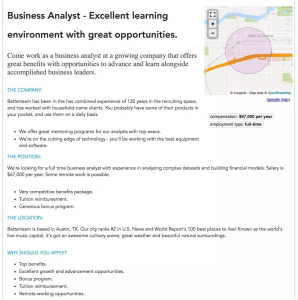
In an earlier post, we discussed the importance of mentoring to the development of one’s executive presence. In this post, we will examine the other side of mentorship: being a responsible mentee. Many young people, when they begin to enter the workforce, start to actively seek out a mentor. They do so at business networking events, within their own networks, or perhaps within their existing circles. So, what’s the best way to secure a mentor, and what do you do once you have one?
Finding “the one”
Task number one not only involves finding a mentor, but finding the right mentor. The idea is not simply to find someone successful, well-educated and willing to mentor you. It goes far beyond convenience; the mentor you should (and who choses you) should be someone who is equipped to mentor, in your field and who’s in it for the long run. Ideally, it is also someone who shares, at least to some extent, your morals, integrity and ambition. If and when you think you’ve found the right person, try to get to know them, at least to some extent, before asking them to be your mentor. You want this person to know that you respect and admire them as a person, regardless of your own personal interests.
Once you’ve found them…
A common misconception when it comes to mentor/mentee relationships is that it’s up to the mentor to keep the relationship going. It is, almost 100%, the responsibility of the mentee to do so. Chances are great that a mentor will be older and quite a bit busier than their new mentee. It is important that, as a mentee, you keep your new mentor engaged and eager to mentor you.
Here are a top 3 tips to help you stay on track in your new mentor/mentee relationship:
- Know your USP: What’s your unique selling proposition? What sets you apart from everyone else? The ability to be able to communicate your distinct value to your mentor is of the utmost importance, especially in the beginning stages of the relationship.
- Techno-etiquette: Mind your p’s and q’s (double-entendre intended)! What I mean by this is two-fold: firstly, you will more likely than not be using email to communicate with your mentor on a regular basis. Always be professional, polite and respectful in your emails and use proper email structure. Secondly, always, always, double and triple check for typos in any and every email that you send. Sending flawless emails is a great way to show your attention to detail!
- Be well prepared: Always show up to meetings with your mentor prepared and with an agenda. Chances are that meetings with your mentor will be shorter rather than longer, as you both likely have very busy schedules. To make the most out of your time together, always show up with questions to ask, topics to touch on, or comments to make.
Developing a strong and fruitful relationship with a mentor can be rewarding in more ways than one. They can inspire you, help you along your career path, introduce you to their network, amongst so many other things. With any luck, if you put enough time and energy into nurturing this new relationship, it can last for years, and become stronger as time goes by. Never underestimate the power of a successful mentor/mentee relationship!
Business & Finance Articles on Business 2 Community(37)








